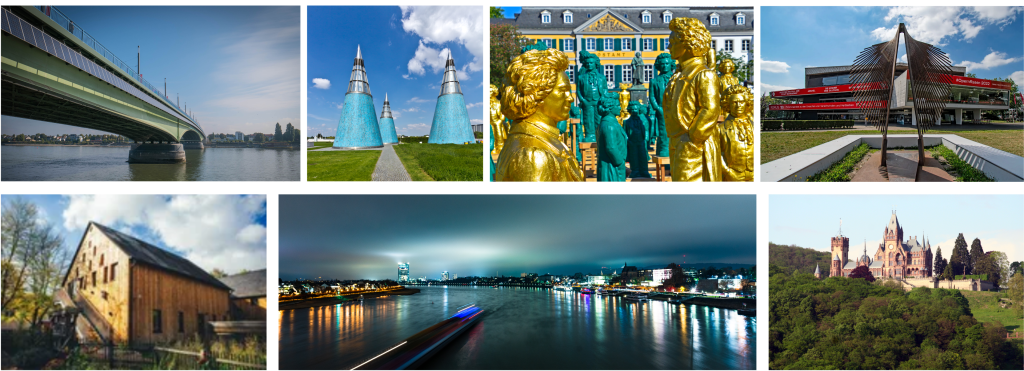
Venue | Accommodations | Transportation | Visa | Emergency | Explore Bonn
The GEWEX SSG-38 will take place from Monday to Friday, 23–27 March 2026 at:
ECMWF
Temporary location:
Bundesministerium für Umwelt, Klimaschutz, Naturschutz und nukeare Sicherheit
Robert-Schuman-Platz 3,
53175 Bonn
Germany
For information about hotels and other accommodation in Bonn, see the City of Bonn website Accommodation section.
For information (in German and English) about traveling to Bonn by air or train as well as about traveling within Bonn by public transport, rental car, taxi or bicycle, see the City of Bonn website Transport and Travel section: Transport and travel. | English website (bonn.de)
Getting to ECMWF in Bonn
By air
Cologne/Bonn, Düsseldorf and Frankfurt Airports are well connected to Bonn by bus or train.
From Cologne/Bonn Airport using:
From Frankfurt Airport, an Intercity-Express (ICE) train to Cologne stops at the town of Siegburg (travel time approx. 45 minutes). From Siegburg, the underground line 66 (U-Bahn) links to Bonn Central Station (Hauptbahnhof), taking approximately 45 minutes.
From Düsseldorf Airport, a direct regional train connects to Bonn UN Campus or Bonn Central Station (Hauptbahnhof) in approx. 65 minutes.
By train
With Bonn Central Station (Hauptbahnhof) and the train stations in the districts of Bad Godesberg, Beuel, Duisdorf and Oberkassel, Bonn is well integrated in the network of Deutsche Bahn’s long-distance and regional lines. Bonn/Oberkassel train station is just on the other side of the river from ECMWF: from the train station, it is a 7-minute walk to the Oberkassel Nord underground station (U-Bahn), where you can take line 66 to Robert-Schuman Platz.
A taxi from Bonn Central Station (Hauptbahnhof) to ECMWF will take approximately. 20 minutes; taxi fare approx. EUR 20.
By bus
For the long-distance bus lines, there is a bus stop near the Museumsmeile, at the corner of Joseph-Beuys-Allee and Marie-Kahle-Allee.
By public transport
The closest public transport stop to ECMWF is ‘Robert-Schuman-Platz’ (approx. 2-minute walk):
* Underground (U-Bahn) lines 66 and 68
* Bus routes 631 and 638
Stop ‘Deutsche Telekom/Olof-Palme Allee’ (approx. 12-minute walk):
* Underground (U-Bahn) lines 16 and 63
Stop ‘Rheinaue Hauptzugang’ or ‘Rheinaue Parkrestaurant’ (approx. 10-12 minute walk):
* Bus route 610 or 611
By car/taxi
From nearest train station (Bonn UN Campus): approx. 5 minutes by car. Head on Joseph-Beuys Allee bear right onto Nahum-Goldmann Allee, road name changes to August-Bebel Allee. Turn left into Marie-Schlei Allee, which becomes Heinemannstrasse after the crossroad. Turn left into Jean-Monnet Strasse, then turn right on to Kurt-Georg-Kiesinger Allee. The BMUKN building is straight ahead, behind a row of flagpoles where you will see the ECMWF flag among others. Report to security officers at Reception.
The BMUKN ministry has a parking lot accessible to visitors that have been previously announced to Security by email. The entrance is located between the Robert-Schuman-Platz metro exit and the BMUV building. Visitors should ring the bell in the white column and announce their names. It is open from Monday to Friday from 7:00 to 21:00. Cars cannot stay there at night. It can contain about 40 cars and is managed on a first-come, first-served basis. For additional information click here.
If you wish to travel by taxi and pay by card, it is advisable to check with the driver first if card payment is accepted.
Germany is part of the Schengen area. Generally speaking, third-country nationals require a visa to enter the Federal Republic of Germany. An exemption applies to EU nationals and nationals of those countries for which the European Community has with the visa regulation of the European Union abolished the visa requirement for short stays of up to 90 days in a 180‑day period. You can check here to see if you require a visa:
Table of countries whose citizens require/do not require visas to enter Germany.
The emergency number 112 connects you directly to a control center at any time throughout Europe, in North Rhine-Westphalia to an integrated control center for fire and rescue services. Using 112 avoids time delays in an emergency.
For detailed information about emergency services and non-life threatening situations, visit https://www.bonn.de/themen-entdecken/sicherheit-ordnung/notfall-notdienste.php?loc=en.
Bonn is a federal city in North Rhine-Westphalia, Germany, situated on the banks of the Rhine River. It served as the capital of West Germany from 1949 to 1990 and remained the seat of government for reunified Germany until 1999, when the capital moved to Berlin. Today, Bonn offers a variety of attractions and cultural sites for visitors to explore. The city combines historical significance with modern amenities and natural beauty. For a comprehensive overview of activities and places to visit, detailed information is available on the official city website at www.bonn.de/bonn-erleben/besichtigen-entdecken/index.php.
